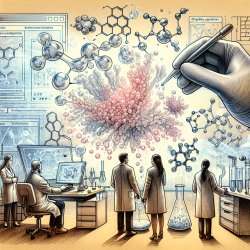Introduction
The field of oncology is constantly evolving, with new therapies emerging to tackle challenging conditions like relapsed/refractory acute myeloid leukemia (AML) and myelodysplastic syndrome (MDS). A recent study titled "First-in-human study of JNJ-67571244, a CD33 × CD3 bispecific antibody, in relapsed/refractory acute myeloid leukemia and myelodysplastic syndrome" offers valuable insights into a novel therapeutic approach. This blog aims to explore the findings of this study and discuss how practitioners can leverage these insights to improve patient outcomes.
Understanding JNJ-67571244
JNJ-67571244 is a CD33 × CD3 bispecific antibody designed to engage T-cells and target CD33-positive cells, which are prevalent in AML and MDS. The study was a first-in-human, open-label, phase I trial that focused on determining the maximum tolerated dose (MTD), recommended phase II dose (RP2D), safety, tolerability, and preliminary clinical activity of JNJ-67571244 in patients with relapsed/refractory AML or MDS.
Key Findings
- The study included 68 patients and assessed 10 dose-escalation cohorts.
- 11 patients experienced dose-limiting toxicity, and all participants encountered treatment-emergent adverse events (TEAEs).
- Despite some temporary reductions in disease burden, no significant clinical responses were observed.
- JNJ-67571244 administration led to increased cytokine levels, associated with cytokine release syndrome and infusion-related reactions.
- A prolonged step-up dosing strategy was tested but did not mitigate hepatotoxicity.
Implications for Practice
While the study did not achieve its primary endpoints of determining MTD and RP2D, it provides critical data on the safety and pharmacodynamics of JNJ-67571244. Practitioners can use these insights to:
- Understand the potential risks associated with bispecific antibodies in AML and MDS treatment.
- Consider alternative dosing strategies to improve tolerability and minimize adverse effects.
- Encourage further research into optimizing the therapeutic window for bispecific antibodies.
Encouraging Further Research
This study underscores the complexity of developing effective treatments for AML and MDS. Practitioners are encouraged to stay informed about ongoing research and consider participating in clinical trials to contribute to the advancement of therapeutic strategies. Collaboration with research institutions and pharmaceutical companies can also facilitate access to emerging therapies and enhance patient care.
Conclusion
The "First-in-human study of JNJ-67571244" provides a foundation for future research and clinical application of bispecific antibodies in hematologic malignancies. By integrating these findings into clinical practice, practitioners can contribute to the evolution of treatment paradigms and ultimately improve outcomes for patients with relapsed/refractory AML and MDS.
To read the original research paper, please follow this link: First-in-human study of JNJ-67571244, a CD33 × CD3 bispecific antibody, in relapsed/refractory acute myeloid leukemia and myelodysplastic syndrome.










